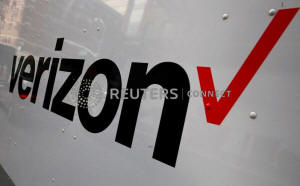|
Total operating revenue, however, rose just 1 percent to $34.28
billion in the quarter ended Dec. 31, missing the average
analyst estimate of $34.44 billion.
The company also forecast capital spending for 2019 in the range
of $17 billion to $18 billion, including costs for the expanded
commercial launch of 5G, compared with $16.7 billion last year.
Verizon launched 5G home internet in four cities in October last
year, and claimed to be the first to bring a commercial 5G
product in the United States amid heated competition between
major carriers.
The company also said in December it was working with Samsung
Electronics Co Ltd to launch 5G enabled smartphones in the first
half of 2019.
The largest U.S. wireless carrier by subscribers said it added a
net 653,000 phone subscribers during the fourth quarter, beating
the average estimate of 355,600 net additions, according to
research firm FactSet.
It lost 46,000 Fios video subscribers during the quarter, more
than the 29,000 it lost last year, as viewers continue to favor
cheaper internet TV services over paying for pricier cable
packages. The latest subscriber losses were, however, fewer than
analysts' estimate of 51,000 losses.
Net income attributable to the company fell to $1.94 billion, or
47 cents per share, in the fourth quarter, from $18.78 billion,
or $4.56 per share, a year earlier, when it recorded a $16.8
billion one-time benefit from the U.S. tax overhaul.
Excluding items, Verizon earned $1.12 per share, above the
average estimate of $1.09 per share, according to IBES data from
Refinitiv.
(Reporting by Akanksha Rana in Bengaluru and Sheila Dang in New
York; Editing by Saumyadeb Chakrabarty)
[© 2019 Thomson Reuters. All rights
reserved.] Copyright 2019 Reuters. All rights reserved. This material may not be published,
broadcast, rewritten or redistributed.
Thompson Reuters is solely responsible for this content.

|
|





